Event Reports
The 2nd JST Workshop ", "Promoting Activities toward Research Integrity-- Considering the Need for the Research Integrity and Its Educational Programs" (Part 1) Introducing the Current Situation and Sharing a Sense of Purpose (28 Sep '17)
The 2nd JST Workshop was held on 28 August, 2017 in Tokyo and 22 September, 2017 in Kobe, with Professor Jun Fudano of Tokyo Institute of Technology as a lecturer. Many people involved in research ethics education gathered from universities and research institutions for this workshop, learned valuable lessons from the professor, and did group work throughout the day. Participants formed 22 groups of five to six participants from similar research fields, and discussed the Responsible Conduct of Research (RCR) and shared ideas on how education should be.
Overview of the current situation of research ethics education
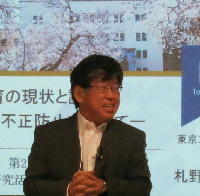
In response to the rapid increase in research misconduct, the world has seen higher attention to research integrity since the 1990s. Since 2010, researchers in the United States must take ethics training when they receive public research grants. RCR (Responsible Conduct of Research) education, as well as education for preventing research misconduct has been recognized as the core of fostering researchers. Various tools and educational programs have been developed for these purposes, and the program developed at the University of California San Diego is the prototype for this workshop.
Since the Ministry of Education, Culture, Sports, Science and Technology of Japan (MEXT) revised the Guidelines for Responding to Misconduct in Research in 2014, universities and research institutes have been considered responsible for research misconduct, and demands were made to set up systems for preventing misconduct and carrying out research ethics education.
Three years on since the guidelines were published, almost all national universities and research institutes have established systems for conducting research ethics education (see the survey on implementation status of the guidelines by MEXT). Each university and research institution have a research ethics education officer, has established codes of conduct and rules for preventing misconduct by researchers, and has carried out research ethics education at least once a year. Although universities and research institutions have systems on research ethics, the issue is how the content of the education should be enhanced.
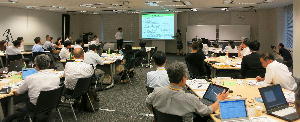 Professor Fudano introduced Tohoku University's initiatives as a good practice. Research ethics education at Tohoku University offers training opportunities customized to the roles and stages of trainees; the training is divided into six levels, with each being tailored for students in the first half of the undergraduate program, newly appointed researchers, principal investigator, and so on, and each level has different learning criteria.
Professor Fudano introduced Tohoku University's initiatives as a good practice. Research ethics education at Tohoku University offers training opportunities customized to the roles and stages of trainees; the training is divided into six levels, with each being tailored for students in the first half of the undergraduate program, newly appointed researchers, principal investigator, and so on, and each level has different learning criteria.
What RCR education covers and what it aims for
Professor Fudano presented the example of what RCR education will cover, created by the U.S. National Institutes of Health. He noted that these items are minimum requirements that all researchers should know and understand, and that researchers should develop the following three skills as well in RCR education, according to a long-term survey on experts by the Office of Research Integrity of the United States.- ・Fostering an attitude toward research integrity and one's reputation as a professional researcher
- ・Developing ethical sensitivity and the skills to identify ethical problems in research
- ・Developing skills to solve ethical problems
Professor Fudano also described how there are not enough high-quality teachers, how teachers decide education methods at their own discretion, and other problems that should be solved in the future.
In addition, he pointed out that goal of RCR education is not just to train researchers with knowledge and skills.
Regarding the basic principle of ethics related to science and technology, the Codes of Conducts for Scientists say that scientists are responsible for contributing to "health and welfare of humanity and safety and security of society." Professor Fudano emphasizes that putting "safety, health, and welfare of the public" before everything else and doing ethical research will contribute to making existence greater than oneself, namely humanity, better, and will also make it possible for researchers to live better and happier lives.
Again, the goal of RCR education is not just to prevent research misconduct and suspicious research. It should promote responsible research activities and inspire every researcher to enhance their well-being.
In this way, Professor Fudano introduced "aspirational ethics" as ethics that researchers should think about to be a better researcher. He explained that there are two types of research ethics: "preventive ethics" and "aspirational ethics," and that while preventive ethics was prevalent to comply with laws and regulations in the past, both ethics will be necessary to achieve responsible research activities.
Why is RCR education necessary now? Organize thoughts through role play
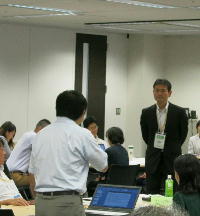 For the role play in the first group work, each group looked back what they have learned and discussed "why RCR education is necessary", and based on the results of the discussion, they tried to persuade a person acting as a principal investigator who is skeptical of RCR education. It was a great opportunity for researchers where they simulated how to convey the understand on the necessity of RCR education using all kinds of explanations and counterarguments. Below are examples of discussion between a person acting as a PI and a person who persuade the PI, and of advice by Professor Fudano.
For the role play in the first group work, each group looked back what they have learned and discussed "why RCR education is necessary", and based on the results of the discussion, they tried to persuade a person acting as a principal investigator who is skeptical of RCR education. It was a great opportunity for researchers where they simulated how to convey the understand on the necessity of RCR education using all kinds of explanations and counterarguments. Below are examples of discussion between a person acting as a PI and a person who persuade the PI, and of advice by Professor Fudano.[Example 1]
Persuader: "We need RCR education in order to ensure the quality of research, benefit both researchers and research institutions, and fulfill our social responsibility."
PI: "Our research institution has never experienced research misconduct, so we do not need to start RCR education."
Persuader: "The world is changing. Just because nothing has happened so far doesn't mean that it won't in the future."
[Example 2]
Persuader: "Once research misconduct happens, it puts the social responsibility of our organization into question."
PI: "Using our research time for RCR education is just getting our priorities backwards."
Persuader: "The time required to deal with misconduct is far longer than time necessary for education."
Professor Fudano offered advice that, for example 1, it is effective to show data that misconduct happens even in places where no misconduct has happened before, and for example 2, the persuader could answer that time for research is not reduced if they consider ethics during research, and will enhance its quality.
What RCR education aims for, and what researchers should learn
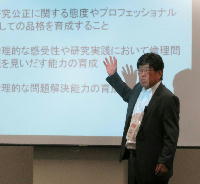
In the next group work, participants in each group reviewed "what RCR education aims for and what researchers should learn", and shared opinions on what priority should be given to it in their own fields or institutions.
Groups listed a wide range of items related to knowledge and understanding according to the characteristics of each field and institution as the contents to be covered in RCR education. They also shared the following opinions, including why we need to educate researchers on dignity and problem-solving skills.
Groups listed a wide range of items related to knowledge and understanding according to the characteristics of each field and institution as the contents to be covered in RCR education. They also shared the following opinions, including why we need to educate researchers on dignity and problem-solving skills.
- ・I think researchers should be able to make ethical decisions on their own.
- ・RCR education should also provide lessons on dignity and problem-solving skills.
- ・"Developing ethical sensitivity and the skills to identify ethical problems in research" is crucial, and misconduct will happen without this ethical sense.
There were also opinions on how to provide education on dignity and problem-solving skills, how to measure and evaluate its effect, and other concerns and problems.
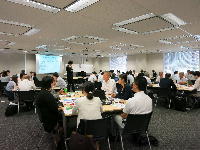 The professor said that dignity and problem-solving skills are difficult to measure and evaluate, and it is difficult to cover in conventional education. It was then explained that these are essential for educators and researchers, and since educational materials and tools for improving the skills have been developed, it should include dignity and problem-solving skills as the ultimate goal in the future.
The professor said that dignity and problem-solving skills are difficult to measure and evaluate, and it is difficult to cover in conventional education. It was then explained that these are essential for educators and researchers, and since educational materials and tools for improving the skills have been developed, it should include dignity and problem-solving skills as the ultimate goal in the future.He then told participants to think about with their colleagues, on the basis of the results of this group work, what education items are high priority for their research institutions and what methods they can implement when they returned to their universities or research institutions.
In the next article (Part2), "Planning Effective RCR Education Programs" will be covered.
Related Articles:
- The 2nd JST Workshop, "Promoting Activities toward Research Integrity-- Considering the Need for the Research Integrity and Its Educational Programs" (Part 2) Introducing the Current Situation and Sharing a Sense of Purpose (22 Sep '17)
- JST Workshop on Promoting Activities toward Research Integrity - Education in the Research Field - (8 Mar '17, 14 Mar '17)

